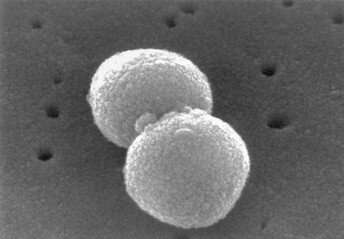Scientists shed new light on how lung bacteria defend against pneumonia

New insight on how bacteria in the lungs protect against invading pathogens has been published today in the open-access eLife journal.
The study in mice shows that a strain of lung bacteria called Lactobacillus provides a barrier against Streptococcus pneumoniae (S. pneumoniae) colonization in animals previously infected with influenza A virus when applied therapeutically following infection. S. pneumoniae can cause severe pneumonia especially in elderly patients. In light of increasing antibiotic resistance, these findings suggest that probiotics may offer an alternative treatment approach for bacterial lung infections.
In healthy organisms, 'commensal' bacteria, which live inside the host without harming it, provide a competitive barrier against invading bacterial pathogens. "It is already well known how commensal bacteria in the gut fight off pathogens," explains co-first author Soner Yildiz, Postdoctoral Research Fellow at the University of Geneva, Switzerland. "But how lung bacteria such as Lactobacillus carry out this role is less clear."
To address this gap, Yildiz and colleagues studied the role of lung microbiota against Pneumococcus colonization in mice. The team had previously reported that a significant amount of Lactobacillus bacteria, which are known to act as antimicrobials and immune system modulators, exist in the lung microbiota of healthy mice. In the current study, they identified these commensal bacteria as Lactobacillus murinus (L. murinus), with further gene sequencing and microscopy showing that the bacteria are tightly associated with mouse lung tissue.
The team next exposed cultures of L. murinus to S. pneumoniae. They found that L. murinus inhibited the growth of the pathogen through the release of lactic acid. "This antibacterial activity was not limited to S. pneumoniae," says co-first author João Pereira Bonifacio Lopes, Ph.D. student at the University of Geneva. "It also affected S. aureaus, the pathogen that can cause bloodstream, bone and joint infections, as well as pneumonia."
Finally, they treated mice with L. murinus following influenza A infection and found that the bacteria provided a barrier against pneumococcal colonization in the animals.
"This suggests that resident commensals in the lung could be applied as probiotics to counteract lung colonization by pathogenic bacteria," concludes senior author Mirco Schmolke, Group Leader at the University of Geneva. "However, further studies are needed before this can be explored as a potential treatment in humans. If it one day proves to be effective, the approach could improve the clinical outcomes for patients who are susceptible to respiratory tract infections."
More information: Soner Yildiz et al, Respiratory tissue-associated commensal bacteria offer therapeutic potential against pneumococcal colonization, eLife (2020). DOI: 10.7554/eLife.53581




















